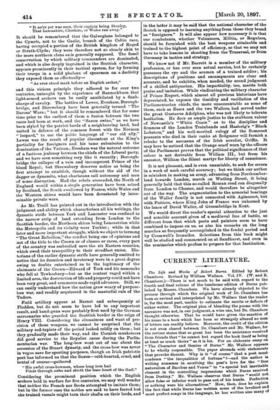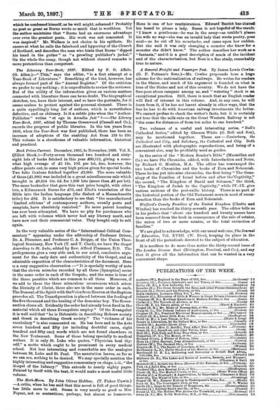CURRENT LITERATURE.
The Life and Works of Robert Burns. Edited by Robert Chambers. Revised by William Wallace. Vol. IV. (W. and R. Chambers.)—There is not much to be said with regard to the fourth and final volume of the handsome edition of Burns pub- lished by Messrs. Chambers. We have already objected to the process through which the original work of Dr. Chambers has been so revised and interpolated by Mr. Wallace that the reader is, for the most part, unable to estimate the merits or defects of either writer. The original plan of blending the poems with the narrative was not, in our judgment, a wise one, but Dr. Chambers thought otherwise. That he would have given the sanction of his name to a book which has been so strangely altered no man of letters can readily believe. Moreover, the credit of the edition is not even shared between Dr. Chambers and Mr. Wallace, for the reviser states that so great has been the assistance received from friends that " he cannot but regard the book itself as being at least as much theirs " as it is his. For an elaborate essay on " The Character and Genius of Burns" Mr. Wallace appears to be wholly responsible. The paper abounds with statements that provoke dissent. Why is it "of course" that a poet must condemn "the inequalities of fortune" ?—and the author is writing nonsense in ascribing the poet's love for the " free naturalism of Bacchus and Venus" to "a special but inevitable element in the controlling impressions which Burns received from Destiny." Mr. Wallace observes that Burns "would not allow false or inferior work to pass out of his hands. Perfection or nothing were his alternatives." How, then, does he explain the fact that while Burns has written some of the loveliest and most perfect songs in the language, he has written also many of which he confessed himself, as he well might, ashamed ? Probably no poet so great as Burns wrote so meth that is worthless. Yet the author maintains that "Burn had an enormous advantage over even the greatest poets.. His work was not concocted. It was inspired." Mr. Wallace is not choice in his epithets. He sneers at what he calls the falsehood and hypocrisy of the Church of Scotland, and describes the man who hints that Burns " dipped his hand in the gutter" as "a prowling publisher's jackal." On the whole the essay, though not without shrewd remarks is more pretentious than competent.







































 Previous page
Previous page